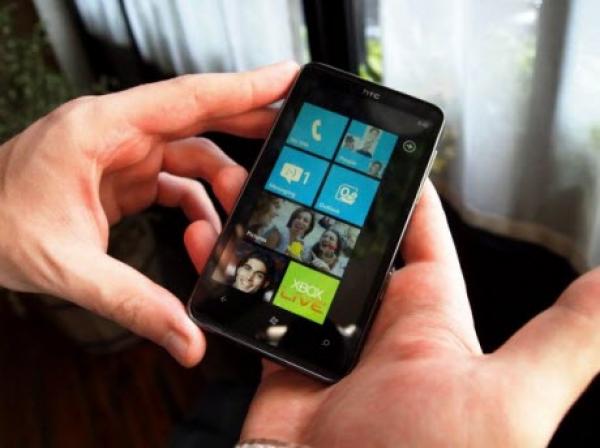To Apple's iPhone and Google's Android, Microsoft has one thing to say: "Daddy's home!"
Even though Microsoft’s been missing in action for this generation of smartphones, that time is over.

Would someone please string Steve Ballmer up by his private parts and shake him until he wises up?
No, I’m not talking about his recent bonus penalty imposed by the board. I’m, instead, talking about the idiotic naming of Windows Phone 7.
Apple has the iPhone. It’s a hip name, it’s cool, and it allows Apple fanatics to be insufferable in their “we’re too cool for our shoes” attitude. Google has Android or “Droid,” with the Verizon models equipped with a Cylon recording that’s just slicker than snot to play. BlackBerry is a nice, easy-to-remember name.
But Microsoft Windows Phone 7? Seriously? The name makes you ask, “Is it just another Windows CE phone? And 7? What about 8?” It’s not clear whether the brand is “Microsoft Phone,” or, maybe, “Windows Phone,” and it doesn’t seem to give the company room to grow the line’s branding over the space of years.
Microsoft has often made branding mistakes, but to saddle what’s likely to be a game changing phone OS with a name like Microsoft Windows Phone 7? Someone in Redmond should bounce Ballmer up and down on his fiddly bits.
Even so, I think that despite its cumbersome name, Microsoft Windows Phone 7 is a game changer.
Not everyone agrees with me (there’s a surprise!). I deeply respect my colleagues Steven J. Vaughan-Nichols and Preston Gralla, but SJVN says it’s “too little, too late” and Preston says, “iPhone and Android users are probably beyond reach”.
I disagree. I think Microsoft’s Phone is going to flip the smartphone market on its ear, and we’re about to see, well, the Windows market share miracle all over again.
There’s no doubt that Apple, Google, and RIM all have some very smart people in their employ, and so does Microsoft. But this game isn’t about who’s smarter.
It’s also not about who’s got a better fashion sense, because while Apple always fields beautifully designed works of art, Apple doesn’t always field practical devices. Microsoft has shown that while it is often willing to ship pigs that work, it can sometimes summon a deep sense of design, as the company has proven with both the later Zune incarnations and the Xbox.
Windows Phone 7 judo
No, the real issue is that Microsoft almost perfectly counters the weaknesses of its competitors and, this time, is showing surprising strengths.
Let’s start with those strengths. By all accounts, Windows Phone 7 has a very, very nice interface. Even Apple fanboy extraordinaire, John Gruber stated that the new Windows Phone 7 was “really nice” and he was “really impressed.” For the record, Gruber is clearly not one of my fans — kiss, kiss, John, kiss, kiss.
Fanboi-baiting aside, the other Windows Phone 7 strengths track with what’s made Microsoft a powerhouse: its ability to work with top-tier licensees. With HP embroiled in an ongoing made-for-TV battle with Oracle, Dell is likely to become a Windows Phone 7 licensee and ship a product with all of Dell’s normal quality, solidity, and reliability. The same is likely to be repeated by many, many other licensees.
We’re also likely to see Windows Phone 7 devices available for all the major carriers, which gives consumers and enterprises the flexibility they demand.
But what about iPhone?
It’s reasonably clear that Apple introduced an inferior product with the iPhone 4.
As you can see, I’ve written about the iPhone’s problems a lot, but it’s actually gotten worse since my last article. Apparently, the iPhone 4’s screen breaks 82% more than the iPhone 3GS. This is a serious problem for Apple and consumers. The Apple reality distortion field won’t be able to hold when the product’s own glass can’t keep itself together.
So Microsoft’s entering a market where the market leader’s product can’t be held without a special Kung Fu grip, where the back of the device shatters when put into a case, and where the screen breaks 82% more than its outmoded predecessor.
Oh, and, of course, the iPhone can only be used on AT&T’s universally-hated network.
To say Microsoft’s got a serious chance here is an understatement. The iPhone’s time in the sun may well be over.
Recent Posts
- Telemedicine Franchisee in India: Growth Oriented Business Model as Healthcare Investment
- Ladies Garments Franchise Business in India: A Detailed Industry Insight
- Ratnagiri Forever Chemicals Row Intensifies: Parliamentary Spotlight and Local Resistance
- Indore Metro Phase II: Progress, Prestige, and the Imperative of Integrity
- Hindalco Bets Big on Odisha: ₹21,000-Crore Smelter Expansion to Anchor India’s EV Supply Chain






